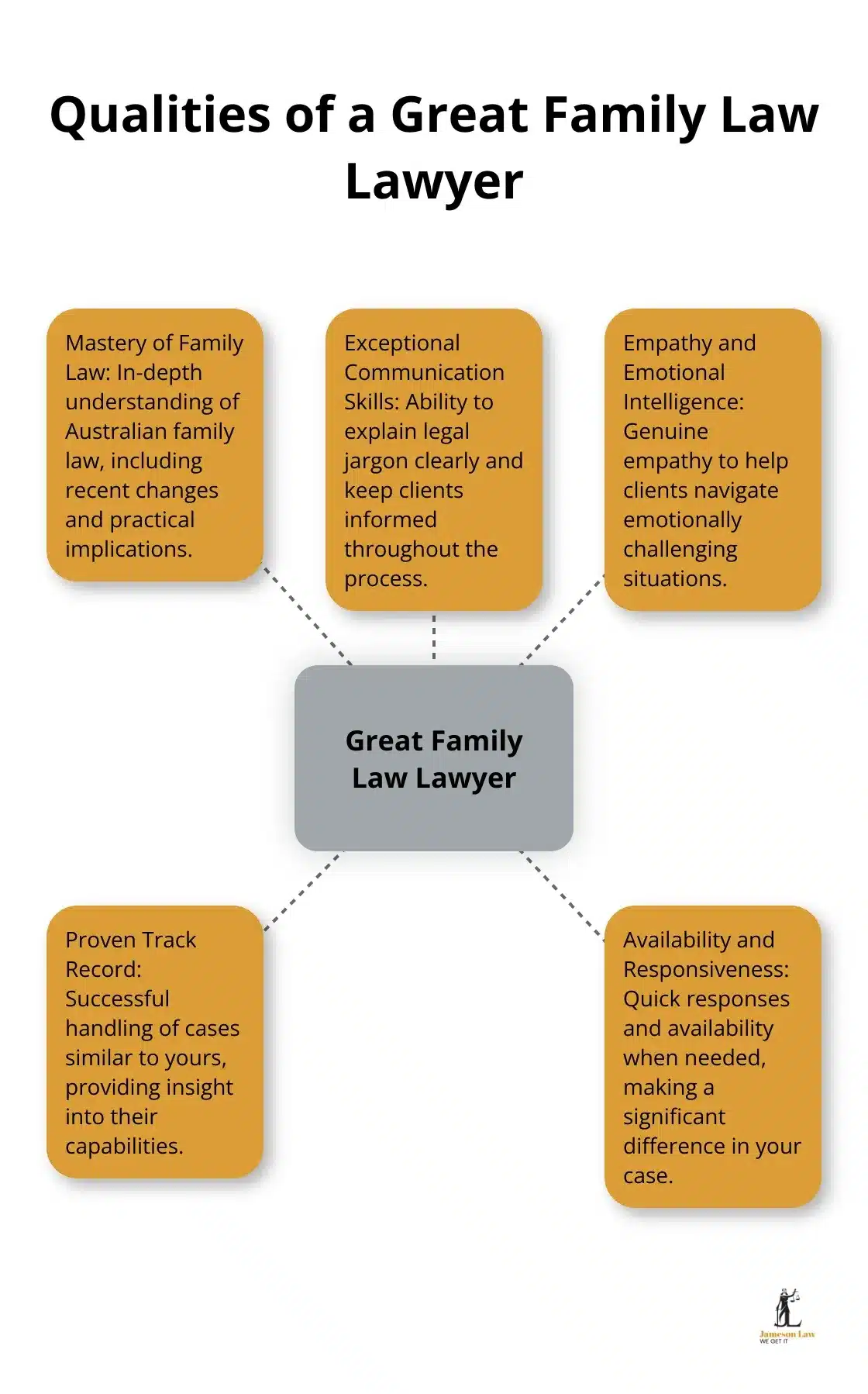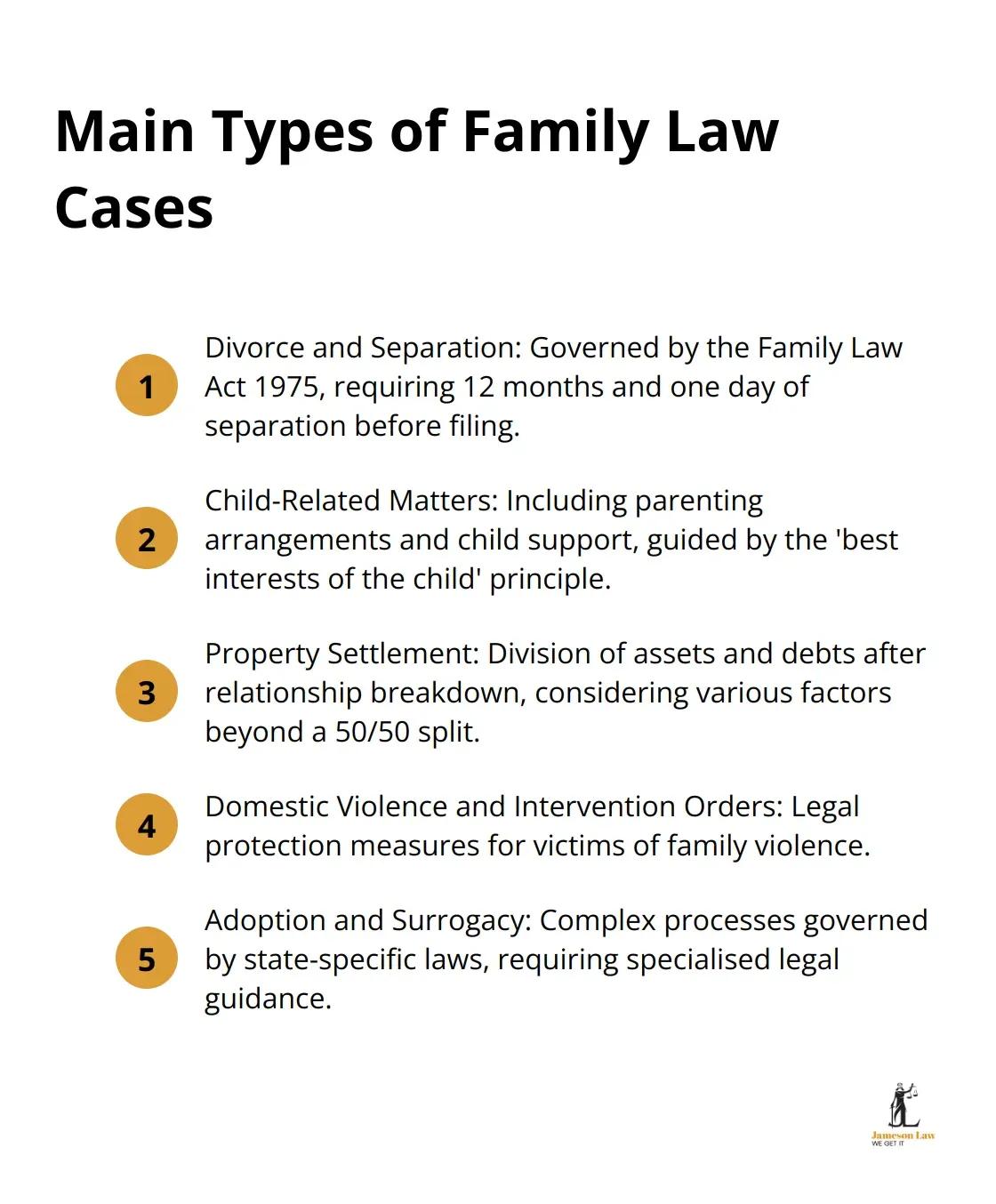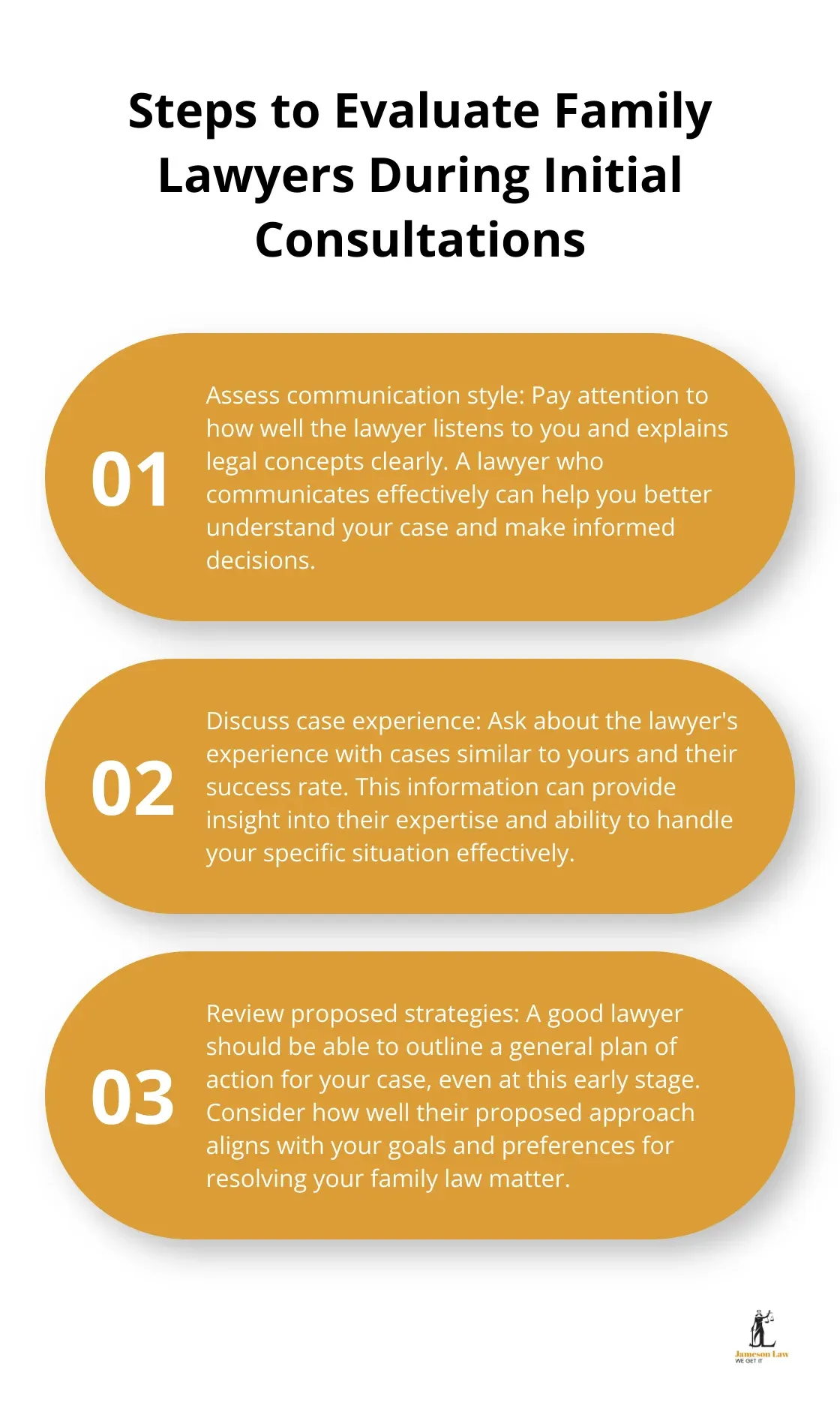Choosing the best lawyer for family law matters can be overwhelming. The right legal representation can make a significant difference in the outcome of your case.
At Jameson Law, we understand the complexities of family law and the importance of finding a skilled advocate. This guide will help you navigate the process of selecting the best family law lawyer for your unique situation.
What Qualities Make a Great Family Law Lawyer?
Family law cases require more than just legal expertise. The best family law lawyers possess a unique combination of skills and qualities that set them apart. Let’s explore the key attributes you should look for when choosing a family law lawyer.

Mastery of Family Law
A top-notch family law lawyer must have an in-depth understanding of Australian family law. This includes knowledge of recent changes, such as the 2021 merger of the Federal Circuit and Family Court of Australia. Two recent Full Court cases highlight the practical implications of this merger for family law cases.
Exceptional Communication Skills
Family law cases often involve complex emotions and sensitive issues. A great family lawyer needs to communicate clearly and effectively, both with clients and in court. They should explain legal jargon in simple terms and keep clients informed throughout the process.
Empathy and Emotional Intelligence
Family law matters can take an emotional toll on clients. A lawyer who shows genuine empathy can make a significant difference in how clients navigate this challenging time.
Proven Track Record
While past results don’t guarantee future outcomes, a lawyer’s track record can provide insight into their capabilities. Look for lawyers who have successfully handled cases similar to yours. For example, if you’re dealing with a complex property settlement, try to find a lawyer with a history of achieving fair divisions of assets.
Availability and Responsiveness
Family law matters often require timely action. A lawyer who responds quickly and remains available when you need them can make a significant difference in your case.
The right family lawyer will not only have the necessary skills and experience but will also make you feel comfortable and confident as you navigate your family law matter. As we move forward, let’s explore the different types of family law cases you might encounter and how they can impact your choice of legal representation.
Understanding the Different Types of Family Law Cases
Family law covers a broad spectrum of legal matters that affect families and domestic relationships. Knowledge of these various case types can help you select the right lawyer for your specific situation.

Divorce and Separation
Divorce and separation represent some of the most common family law cases. To apply for a divorce, you must provide key documents, including your marriage certificate, proof of separation, and, if applicable, a counselling certificate. In Australia, the Family Law Act 1975 governs divorce proceedings. Couples must separate for at least 12 months and one day before they can file for divorce. This period allows both parties to consider reconciliation and make necessary arrangements.
During this time, you should seek legal advice to understand your rights and obligations. A skilled family lawyer can guide you through property division, spousal maintenance, and child-related matters. They can also help you explore alternatives to court, such as mediation or collaborative law (which can be less costly and emotionally taxing).
Child-Related Matters
Child custody (now referred to as parenting arrangements in Australia) often becomes the most emotionally charged aspect of family law. Under Section 60CC of the Family Law Act 1975, the Court determines the best interests of the child based on two primary considerations. This principle guides decisions about where children will live, how much time they’ll spend with each parent, and who will make important decisions about their upbringing.
Child support is another critical issue. The Child Support Agency uses a formula to calculate payments, but a family lawyer can help you understand this process and ensure fair arrangements. They can also assist with more complex issues like international relocation or disputes over schooling and medical decisions.
Property Settlement
The division of assets and debts after a relationship breakdown can become complex. Australian law doesn’t automatically split property 50/50. Instead, it considers various factors including each party’s financial and non-financial contributions to the relationship, and their future needs.
A family lawyer with experience in property settlements can help you identify and value all assets (including superannuation and business interests). They can also advise on tax implications and help negotiate a fair division. De facto couples have the same rights as a married couple when it comes to property rights under the Family Law Act 1975.
Domestic Violence and Intervention Orders
Family violence is a serious issue that requires immediate action. If you’re in danger, contact the police or a domestic violence hotline immediately. A family lawyer can help you obtain an Apprehended Violence Order (AVO) or an intervention order to protect you and your children.
These orders can prohibit the perpetrator from approaching you, your home, or your workplace. They can also set rules about child contact. A lawyer experienced in this area can guide you through the process and represent you in court if necessary.
Adoption and Surrogacy
Adoption and surrogacy laws in Australia are complex and vary by state. For example, in New South Wales, the Adoption Act 2000 and the Surrogacy Act 2010 govern these processes. A family lawyer specialising in this area can help you navigate the legal requirements, which may include health assessments, background checks, and court applications.
For surrogacy arrangements, you need a properly drafted agreement that complies with state laws. This agreement should cover issues like parental rights, medical decisions during pregnancy, and financial arrangements. A skilled lawyer can ensure that all parties’ interests receive protection and that the arrangement is legally enforceable.
Now that we’ve explored the main types of family law cases, let’s look at the steps you can take to find and evaluate family lawyers who can best handle your specific situation.
How to Find and Evaluate Family Law Lawyers
Seek Recommendations from Trusted Sources
Start your search by asking friends, family members, or colleagues who have experienced similar legal situations. Their firsthand experiences can provide valuable insights.
Don’t limit yourself to personal connections. Reach out to other professionals you trust, such as your accountant, financial adviser, or even your GP. These professionals often have networks that include reputable family lawyers.
Conduct Thorough Online Research
After you have a list of potential lawyers, start your online research. The NSW Law Society’s Find a Lawyer search tool is an excellent starting point. It allows you to search the online directory of NSW practices and solicitors who hold a current practising certificate.
Check the lawyers’ websites for information about their experience, qualifications, and approach to family law cases. Look for specific mentions of cases similar to yours.
Online reviews can help, but approach them critically. Focus on reviews that provide specific details about the lawyer’s performance, communication style, and case outcomes.
Schedule Initial Consultations
Most family lawyers offer initial consultations, often at a reduced rate or even for free. Take advantage of this opportunity to meet face-to-face with at least three lawyers.

During these consultations, pay attention to how well the lawyer listens to you and whether they explain legal concepts clearly. Ask about their experience with cases like yours and their success rate.
Don’t shy away from discussing potential strategies for your case. A good lawyer should outline a general plan of action, even at this early stage.
Discuss Fees and Payment Structures
Family law cases can be expensive, so it’s important to understand the financial aspect upfront. Ask for a detailed breakdown of fees, including hourly rates, retainer requirements, and any additional costs you might incur.
Some lawyers offer fixed-fee services for certain types of cases. Inquire about payment plans or alternative fee arrangements if needed. Focus on value for money rather than just the lowest price.
Assess the Lawyer’s Approach and Strategy
Every family law case is unique, and your lawyer’s approach should reflect that. During your discussions, gauge whether the lawyer seems genuinely interested in your specific situation or if they’re offering a one-size-fits-all solution.
Ask about their preferred methods for resolving disputes. Do they prioritise negotiation and mediation, or do they suggest litigation? Research indicates that clients who use counselling, mediation or online dispute resolution reported higher satisfaction levels.
Consider how well the lawyer’s style aligns with your goals. If you hope for an amicable separation, a highly aggressive lawyer might not be the best fit.
Final Thoughts
Choosing the best lawyer for family law matters will significantly impact your case outcome. Key factors include experience, communication skills, empathy, track record, and responsiveness. Understanding different family law case types helps you select a lawyer with the right expertise for your situation.
The right fit goes beyond legal qualifications. It’s about partnering with someone who understands your unique circumstances and aligns with your goals. Whether you face divorce, child custody, or property settlement issues, a lawyer who makes you feel heard and supported is invaluable.
Family law matters can be complex and emotionally challenging. With the right legal representation, you can navigate these difficulties more effectively. At Jameson Law, our team of experienced family lawyers (specialising in various aspects of family law) is ready to guide you through every step of your legal journey.













